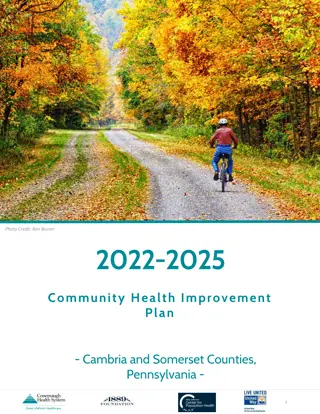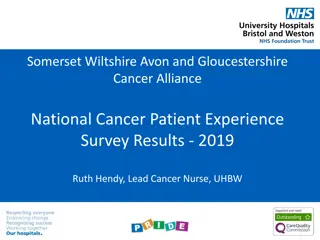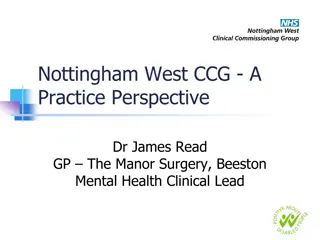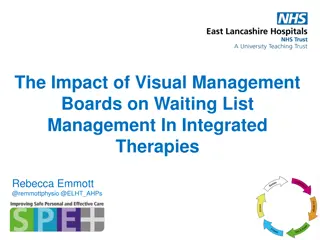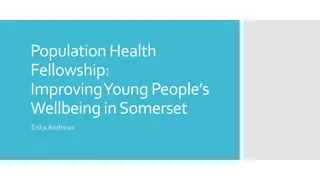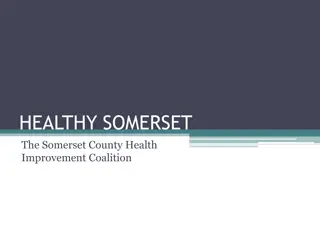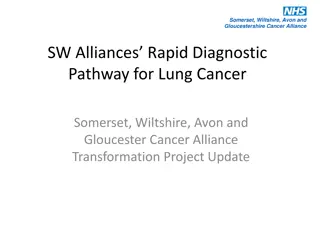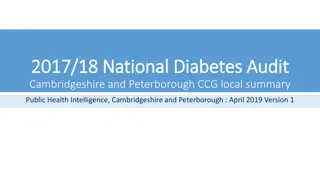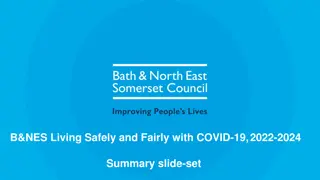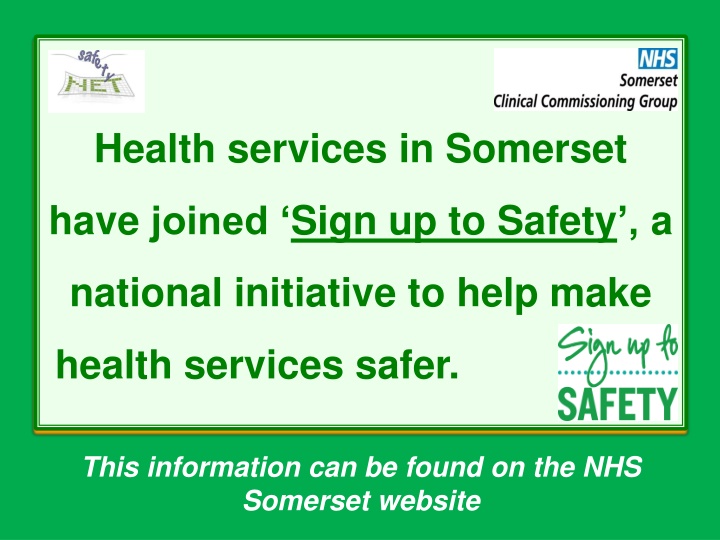
Health Services in Somerset Join Sign up to Safety Initiative
Somerset health services have joined the national Sign up to Safety initiative to enhance patient safety. Learn about preventing pressure ulcers, acute kidney injury, medication safety, and more to keep yourself safe and healthy. Stay informed and take necessary precautions to reduce risks and maintain well-being.
Download Presentation

Please find below an Image/Link to download the presentation.
The content on the website is provided AS IS for your information and personal use only. It may not be sold, licensed, or shared on other websites without obtaining consent from the author. If you encounter any issues during the download, it is possible that the publisher has removed the file from their server.
You are allowed to download the files provided on this website for personal or commercial use, subject to the condition that they are used lawfully. All files are the property of their respective owners.
The content on the website is provided AS IS for your information and personal use only. It may not be sold, licensed, or shared on other websites without obtaining consent from the author.
E N D
Presentation Transcript
Health services in Somerset have joined Sign up to Safety , a national initiative to help make health services safer. This information can be found on the NHS Somerset website
We need everyone to be involved, working together to do what we can to reduce patient safety risks.
You can prevent Pressure Ulcers If you have reduced mobility you are likely to be at risk. Image result for making your stay with us safe regularly when sitting and in bed. Try to keep moving and change position
Look out for red areas on pressure areas; these are where bones are close to the skin and take the body s weight such as hips, bottom or heels. Or where living aids and equipment might press and rub.
Acute Kidney Injury is sudden damage to the kidneys that causes them to stop working properly. What colour is your urine? If you are feeling unwell drink your usual amount of water (or more) every day it s good for your kidneys.
https://www.thinkkidneys.nhs.uk/wp-content/themes/aki/lib/img/brand/site-logo-large.pnghttps://www.thinkkidneys.nhs.uk/wp-content/themes/aki/lib/img/brand/site-logo-large.png Watch out for signs of dehydration confusion, vomiting, diarrhoea, fever, sweats and shaking, and if you are not producing much urine, contact a doctor urgently. What colour is your urine?
https://www.thinkkidneys.nhs.uk/wp-content/themes/aki/lib/img/brand/site-logo-large.pnghttps://www.thinkkidneys.nhs.uk/wp-content/themes/aki/lib/img/brand/site-logo-large.png Some medicines make development of kidney disease more likely. Your doctor may give you advice to follow about stopping them whilst you are unwell.
Medication Safety You should always: keep a record of all the medicines you are taking know why you need each medicine and the advantages for you
read information leaflets for any special instructions, side effects and what to do if they occur if you do not under- stand the information ask your pharmacist, doctor or nurse
make sure any professional who treats you knows about the medicines you are already taking, and if you have an allergy If someone you care for cannot understand and manage their medicines, make sure someone is helping them.
Sharing of Information The NHS is a network of thousands of different services, departments and organisations. Breakdown in communication is one of the biggest risks to patient safety.
When you move between health and care services make sure: you have an accurate up to date list of medicines and give this information to all services involved in your care, so they know right away what medicines you are taking
make sure you are given information about what to expect to happen next, when, and who to contact for any questions when leaving hospital make sure you are given a written summary to share with others involved in your care
Reducing harm from falls Take precautions and if needed seek support As we get older there are a range of factors that increase the risk of falling, such as loss of muscle strength and the side-effects of medicines.
See the Age UK Staying Steady website which advises people to:- Exercise regularly Check eyes and hearing Look after feet Manage medicines Keep bones healthy Check for hazards Tackle the fear of falling
SEPSIS Is difficult to diagnose because it is rare and can develop very quickly, but can look just like many common minor illnesses.
If you are ill and also have one or more of these symptoms, then contact a Doctor so Sepsis can be considered:- slurred speech extreme shivering or muscle pain passing no urine (in a day) severe breathlessness I feel like I might die skin mottled or discoloured
The NHS Choices website also has lots of useful information about health conditions and treatments.
See information on the NHS Somerset website: www.somersetccg.nhs.uk

